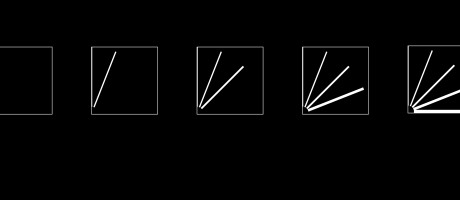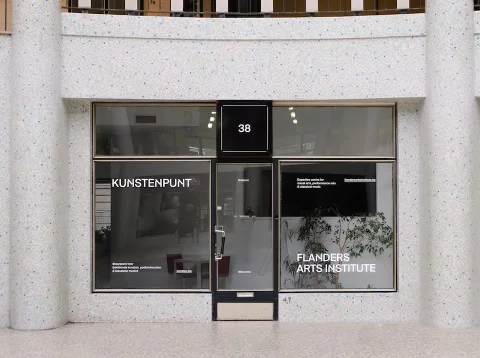
Landscape Sketch of the Arts: session visual arts
Schedule of Landschape Sketch of the Arts: session Visual Arts
| On Thursday 24 October: | |
| 10:00 - 10:10 | Welcome |
| 10:10 - 10:25 | Introduction Landscape Sketch |
| 10:25 - 10:45 | Keynote speech by Samira Saleh and Guy Woueté |
| 10:45 - 11:00 | Break |
| 11:00 - 13:00 | Discussion tables before noon |
| What is art? Who is an artist? | |
| Art workers’ careers and entrepreneurship | |
| Art as a product or as a process? | |
| Landscape care: fragmentation, concertation, collaboration? | |
| 13:00 - 14:00 | Networking lunch |
| 14:00 - 16:00 | Discussion tables afternoon |
| Artistic choices and diverse audiences | |
| Ethical issues | |
| Artist careers and entrepreneurship | |
| Art and education | |
| 16:00 - 16:30 | Break |
| 16:30 - 17:00 | Plenary feedback |
| 17:00 - 18:00 | Drink and guided tour of the expo (optional) |
-
From 10:00 to 10:10
Welcome
by Peter Barry and Eva Wittocx.
-
From 10:25 to 10:45
Keynote speech by Samira Saleh and Guy Woueté
Guy Woueté (1980, CM/BE) is a multidisciplinary artist who works from Antwerp, Douala, and Penja, exploring social themes such as colonialism, migration, and capitalism. His work, ranging from sculpture to video and performance, highlights the influence of Western powers on Africa and explores the possibilities of protest and change.
Samira Saleh (1994) is a powerful voice in the world of spoken word, blending her artistic practice with Egyptian, Moroccan, and Dutch diasporic influences in
Belgium. She is active as a performer, speaker, consultant, and workshop facilitator, creating art that is direct, unrestrained, and uncompromising. -
From 11:00 to 13:00
Discussion tables before noon
Before noon, we'll talk about these four topics.
FAI will sort groups based on a diversity in experiences and backgrounds. In the subscription form, you can indicate the two themes that interest you the most. -
From 11:00 to 13:00
What is art? Who is an artist?
Who is an artist: 'amateurs', 'self-taught', 'newcomers', 'professionals', artists with (or without) a degree in higher art education,...? How do these categories affect us? Who belongs to the (professional) sector? What role do gatekeepers (such as curators, critics, art organisations, art market,...) play? What standards do artists (implicitly) have to meet? How do we bring different or new frames of reference and conceptions of professionalism, quality and success into practice? What role do artists play in society?
-
From 11:00 to 13:00
Art workers’ careers and entrepreneurship
How do you develop your career as an art worker (curator, critic, exhibition maker, agent, consultant, gallerist, private sales, digital creator, ...)? How do you generate income from/for your visual arts activities? Are there (hybrid) income models? How do you secure what you need for your professional development (time, affordable space, access to grants, financial stability, network, partnerships, work-life balance,...)?
-
From 11:00 to 13:00
Art as a product or as a process?
What place does process have in an artist's practice? How do you secure time, space and resources for process in an artist's practice? What value is given to an artist's practice that is primarily process-oriented? How do you operate in a context (institutions, art market, etc.) that is largely product-oriented? What is the role of arts education, arts organisations and arts policy?
-
From 11:00 to 13:00
Landscape care: fragmentation, concertation, collaboration?
The field of visual arts is becoming increasingly diverse: subsidised and unsubsidised, large and small, leisure and professional, art and heritage, new initiatives by artists and citizens, interventions in public space, a growing art market, etc. Different functions come into play, such as development, production, presentation, reflection and participation. Does this wealth of actors form an ecosystem where functions and roles interact? Does the ecosystem allow for broad access to making, experiencing and reflecting on art? Are knowledge, materials, networks and space shared? Is this ecosystem resilient to fill gaps or address challenges collectively? Does art resonate with other sectors such as the social sector, education, care and innovation?
-
From 13:00 to 14:00
Networking lunch
We offer a vegetarian lunch.
-
From 14:00 to 16:00
Discussion tables afternoon
In the afternoon, we'll talk about these four topics.
FAI will sort groups based on a diversity in experiences and backgrounds. In the subscription form, you can indicate the two themes that interest you the most. -
From 14:00 to 16:00
Artistic choices and diverse audiences
Artistic decisions are made on the basis of internationally validated frames of reference, which are then translated and communicated to audiences. How can this mediation be inclusive of different audiences, and does the artist play a role in this process? Do these frames of reference themselves exclude certain art forms and audiences? Is it possible and desirable for the knowledge and needs of these different potential audiences to play a role in the selection process? What new understandings of curating, new job profiles and new relationships between curators and audience and communication workers emerge?
-
From 14:00 to 16:00
Ethical issues
The quest for a just society raises a number of ethical issues that we can no longer avoid, both within the visual arts and in our relationships with society. Where do we stand in seeking fair and transparent partnerships, addressing transgressive behaviour, making space for excluded and unheard voices and working towards servant leadership? Does the visual arts play a role in social injustices such as persecution, war or exploitation of people or the planet, at home and abroad? And if so, how do we do this?
-
From 14:00 to 16:00
Artist careers and entrepreneurship
What role does art education play in preparing artists for their careers? How do you keep learning as an artist? How do you secure what you need to develop your practice (time, affordable space, access to grants, financial stability, network, partnerships, work-life balance,...)? How do you develop your career internationally? What support do you get from organisations, institutions, policies or the art market? What support do less visible artists get? And what support do disabled artists get in their career development? How do we deal with ideas of excellence, (international) success and recognition?
-
From 14:00 to 16:00
Art and education
(session in dutch)
Art and education go hand in hand. Creativity, critical thinking and imagination are crucial to the development of all young people. How do education and the arts come together to design engaging teaching materials, experience contemporary art or work with artists in the classroom? How can the necessary time and resources be made available to schools, arts organisations and artists? Is there room for experimentation and what inspiring practices and methods can strengthen collaboration?
